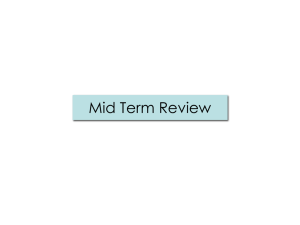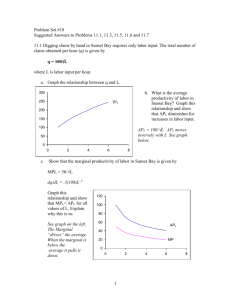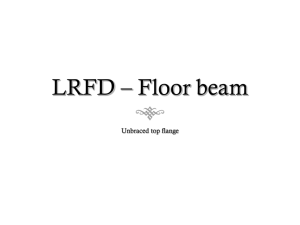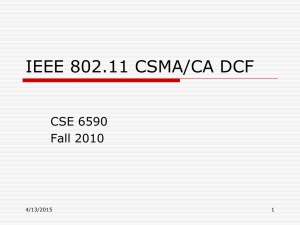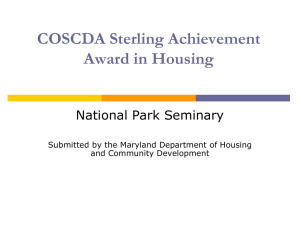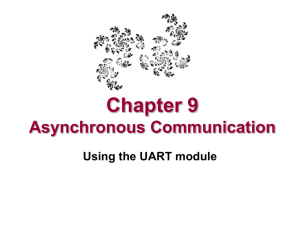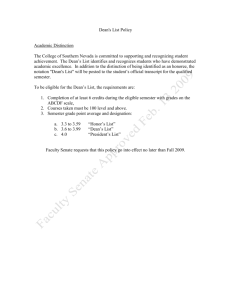Student Handbook - Reformed Theological Seminary
advertisement
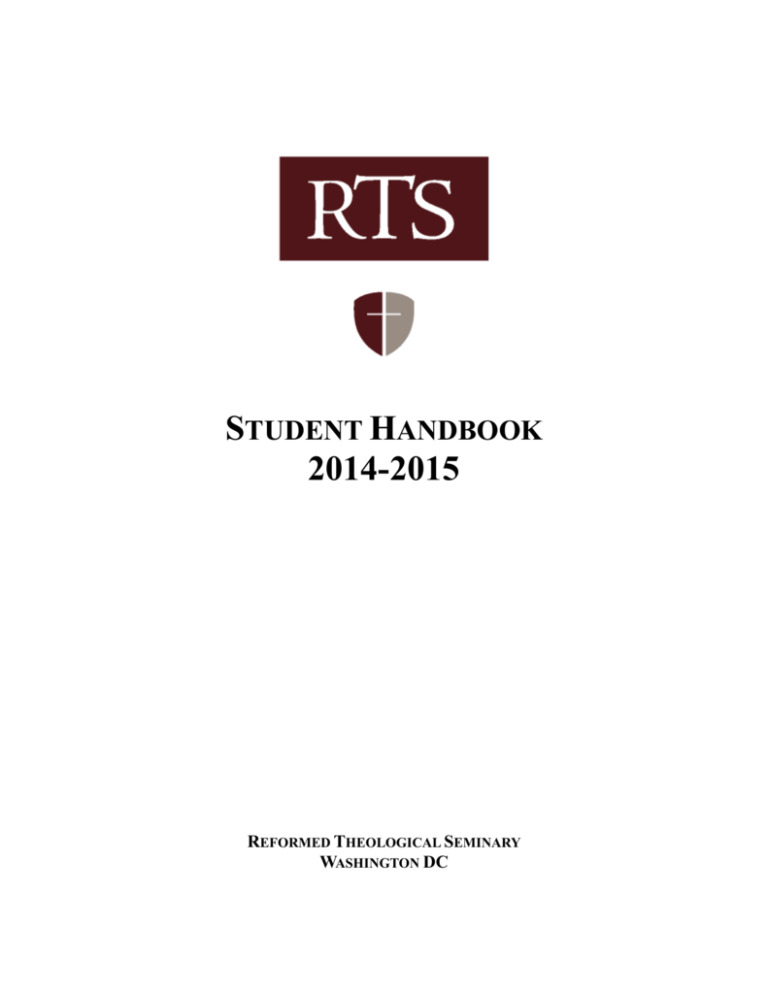
STUDENT HANDBOOK 2014-2015 REFORMED THEOLOGICAL SEMINARY WASHINGTON DC TABLE OF CONTENTS Welcome .......................................................................................................................................................................3 The Reformed Theological Seminary, Introduction .................................................................................................4 RTS Purpose Statement .............................................................................................................................................4 RTS Vision Statement ...............................................................................................................................................4 Accreditation .............................................................................................................................................................4 History .......................................................................................................................................................................5 Spiritual Life ................................................................................................................................................................5 Community Commitments.........................................................................................................................................5 Personal commitments ...............................................................................................................................................6 The Lord’s Day ..........................................................................................................................................................6 Personal & Corporate Prayer .....................................................................................................................................6 Study as a Spiritual Activity ......................................................................................................................................6 Chapel ........................................................................................................................................................................7 Student Services ...........................................................................................................................................................7 Financial Aid .............................................................................................................................................................7 Work Study ................................................................................................................................................................7 RTS Wireless server ..................................................................................................................................................7 Insurance ....................................................................................................................................................................8 Students with Special Needs ......................................................................................................................................8 Student Images ..........................................................................................................................................................9 Carreer Advisement ...................................................................................................................................................9 RTS Washington Facilities ........................................................................................................................................9 Academic Life ..............................................................................................................................................................9 Academic Advising & Concerns ...............................................................................................................................9 Registration .............................................................................................................................................................. 10 Drop/Add Policy ...................................................................................................................................................... 10 Class Attendance ..................................................................................................................................................... 10 Tests & Examinations .............................................................................................................................................. 10 Style ......................................................................................................................................................................... 11 Plagiarism ................................................................................................................................................................ 11 Extension of Time for Papers or Other Academic Work ......................................................................................... 11 Extended Absences and Withdrawal ....................................................................................................................... 11 Grades ...................................................................................................................................................................... 12 Study Habits ............................................................................................................................................................ 12 Library ..................................................................................................................................................................... 12 Field Education ........................................................................................................................................................ 13 Spouses Taking Classes ........................................................................................................................................... 14 Student Records ....................................................................................................................................................... 14 Accreditation standards ........................................................................................................................................... 15 Conduct ...................................................................................................................................................................... 15 Guidelines ................................................................................................................................................................ 15 Student Appeals ....................................................................................................................................................... 15 Sexual Harassment Policy ....................................................................................................................................... 16 Degree Programs ....................................................................................................................................................... 18 Master of Divinity Degree Checklist ....................................................................................................................... 18 Master of Arts (Religion) Degree Checklist ............................................................................................................ 20 Integrative Paper ....................................................................................................................................................... 21 Application for Graduation ...................................................................................................................................... 23 2014/2015 Academic Calendar ................................................................................................................................. 24 RTS Directory ............................................................................................................................................................ 25 2 Welcome Greetings, we extend to you our warmest welcome! We are glad you have chosen to prepare for ministry at RTS Washington and we hope to make your adjustment to seminary life as easy and pleasant as possible. This Student Handbook is designed to help you know what to expect at RTS Washington and what is expected of you. Please read it carefully and keep it for future reference. The Student Handbook contains useful pointers, policies, and procedures designed to help you settle in and stay on track. Faculty and staff are accessible. All administrators and faculty members have office hours. Feel free to contact the appropriate person when you have a question, a suggestion, or a need. We are here to assist you. At RTS Washington, we desire to be a place where close, cordial relationships can be developed between students, faculty, and staff in the Spirit and love of Christ. Please be patient during your first few weeks and months on campus. While the workload is substantial and challenging, you will be able to master the assignments with diligence, hard work, and fervent prayer. Refuse to let temporary discouragements tell you otherwise. Remember, we do everything in the presence of the Lord and for his glory. We want your life at RTS Washington to be characterized by four commitments: 1) a commitment to the truth of the Scriptures and their application to all of life; 2) a commitment to thorough academic work offered to the Lord as your immediate vocation; 3) a commitment toward genuine loving relationships with God and one another, reflecting the self-sacrificing love of our Savior for us; and 4) a commitment to minister to the larger community and to the church as God provides the opportunity. 3 The Reformed Theological Seminary, Introduction RTS Purpose Statement The purpose of RTS is to serve the church in all branches of evangelical Christianity, especially the Presbyterian and Reformed family, by preparing its leaders, with a priority on pastors, and including missionaries, educators, counselors, and others through a program of theological education on the graduate level, based upon the authority of the inerrant Word of God, the sixtysix books of the Bible, and committed to the Reformed faith as set forth in the Westminster Confession of Faith and the Larger and Shorter Catechisms as accepted by the Presbyterian Church in the United States of America as its standard of doctrine at its first General Assembly in 1789. This program shall be characterized by biblical fidelity, confessional integrity, and academic excellence, and committed to the promotion of the spiritual growth of the students. The breadth of this ministry will include multiple campuses and extensions as led by the Lord. RTS Vision Statement Reformed Theological Seminary exists to glorify the Triune God and to serve His Church by providing excellent, globally accessible graduate theological education and pastoral training in the Reformed tradition, and by equipping its students for servant leadership that is marked by “A mind for truth. A heart for God.” RTS-Washington participates in and applies the institutional purpose of RTS by forming generations of Christian leaders marked by a spirit of semper reformanda, which means “Always Reforming.” These kinds of leaders are nurtured in the Word of God and empowered by the Spirit of Christ to reform the church and transform the world. In this way, we hope to contribute to the Church’s role in making Christ’s invisible kingdom visible “… on earth, as it is in heaven.” Accreditation Reformed Theological Seminary is accredited by the Commission on Accrediting of the Association of Theological Schools to award the following degrees: Master of Divinity, Master of Arts, Master of Arts (Biblical Studies), Master of Arts (Religion), Master of Arts (Theological Studies), Master of Arts in Counseling, Master of Arts in Marriage and Family Therapy and Counseling, and Doctor of Ministry. RTS Washington is approved to offer the Master of Divinity and Master of Arts (Religion). The coursework, credits and degree earned at Reformed Theological Seminary may or may not be transferable to another institution. It is at the sole discretion of the receiving institution which credits, if any, will be accepted. The Association of Theological Schools in the United States and Canada: The Commission on Accrediting 10 Summit Park Drive, Pittsburgh, PA 15275-1103 Telephone: 412.788.6505, www.ats.edu 4 Reformed Theological Seminary is accredited by the Commission on Colleges of the Southern Association of Colleges and Schools to award masters and doctorate degrees. Southern Association of Colleges and Schools: Commission on Colleges 1866 Southern Lane, Decatur, GA 30033-4097 Telephone: 404.679.4500, www.sacscoc.org Reformed Theological Seminary is also certified to operate by SCHEV (State Council of Higher Education for Virginia) State Council of Higher Education for Virginia James Monroe Building 101 N. 14th Street, 9th Floor Richmond, VA 23219 History The turbulent 1960s had an impact not only on American politics but also on American churches. After a season of intense prayer during a meeting in a Memphis hotel room, five concerned pastors, led by Dr. Sam Patterson, gave birth to the idea of starting a new seminary committed to the authority of the Scriptures. Reformed Theological Seminary first opened its doors in Jackson, Mississippi, in the fall of 1966 with 14 eager seminary students. Times have changed and the vision has grown. Today, with its strong history and expanding presence, RTS is one of the largest, thriving, cutting-edge seminaries in North America with more than 2500 students across its multiple locations: Atlanta, Charlotte, Houston, Jackson, Memphis, Orlando, Washington D.C. and Global. Over the past 40 years, RTS has educated more than 7,000 ministers, teachers, missionaries and counselors who have taken the Gospel of Jesus Christ to more than 55 countries through more than 46 denominations, reaching millions of men, women and children with that good news. For the complete RTS story, see The First Forty Years, by church historian, librarian, and faculty member John Muether. Spiritual Life Community Commitments As you begin—or continue—your seminary career, we invite you to join us in committing to: 1. The truth of Scriptures in its full expression and in the breadth of its application to all of life (2 Tim. 3:16-17). 2. Sharing of this with each other in hard work and personal service (1 Thess. 2:8). 5 3. A significant and thorough application to academic work offered to the Lord as our immediate vocation (2 Tim. 2:15-16). 4. A genuine and supportive friendship with each other, reflecting the self-sacrificing love of our Savior for us (1 John 3:11, 16-18). Personal Commitments The Apostle Paul wrote Timothy: “Watch your life and doctrine closely...” (1 Tim. 4:16a). Your personal walk with the Lord merits your first and continuing concern. If your studies (even of Scripture and theology) overtake your personal devotion and formation in relational accountability, you can become dry and bitter. Be on guard against this, and cultivate specific disciplines during this time that will bear much fruit under the later (and greater) demands of ministry in the kingdom! John Frame’s, Studying Theology as a Servant of Jesus, contains valuable advice on this subject. The Lord’s Day The Lord’s Day is set aside for your worship with a local congregation and for your rest. You are urged to participate actively in a local church. This will be a valuable and indispensable element in your seminary experience. Some congregations accept students into affiliate membership; others will urge you to transfer your membership to that congregation. Either way, you will find great value in associating with a particular congregation throughout your seminary days. Take some time the first few months to determine where you will attend, and then commit yourself to faithfully attend and serve. Lord’s Day Observance also means that you should search your conscience regarding studying on the Lord’s Day. Please do not call faculty or staff at their homes concerning academic or other seminary-related matters on the Lord’s Day. For a list of area churches that students, faculty and staff attend, please contact the Director of Student Services. Personal & Corporate Prayer Opportunities for prayer—some organized, some spontaneous and individual—occur regularly. We vigorously encourage you to take advantage of them and to institute such practices regularly with your seminary classmates and faculty. Study as a Spiritual Activity Studying and preparing for class is your primary responsibility before God during your seminary days. Preparation for ministry is a consecrated activity. Commit yourself to preparing thoroughly and approaching your study as a devotional service of worship. 6 Chapel Chapel provides a venue for weekly worship of our Lord and fellowship among students, faculty and staff. See our website, or contact the Dean of Students, for the current meeting time. Student Services Financial Aid Financial Aid is awarded annually in the form of need-based grants, need-based partnerships with particular ministries, or merit based scholarships. These scholarships and grants are not considered loans, therefore, no repayment is required. All students who desire to be considered for Financial Aid must complete a Financial Aid application by June 1 for the following academic year. Since applications are submitted on an annual basis, there are no standards of academic progress required for continued participation within a current scholarship award year. The Scholarship Committee reviews each application and determines aid depending upon allocation of available resources. Funding comes primarily through the generosity of churches and friends of the seminary. All students who desire to be considered for Financial Aid must complete a Financial Aid application by June 1 for the following academic year. It is customary for students to graduate without incurring indebtedness for their seminary education. RTS is distinct in this important aspect of preparing students for successful ministry. Work Study Please contact the President of RTS-DC for more information. RTS Wireless server Wireless network service is available for all members and guests of the RTS community. Current configuration information is as follows: RTS Wireless Network Usage Policy Use of RTS wireless networking services implies consent to RTS Wireless Network Usage Policy as follows: 1. Wireless network access is provided for use by members of the RTS community and is intended to support and enhance the educational experience. 2. Providing a safe and secure technological environment in a community setting requires cooperation from all members of the community. 3. Wireless network access may, on occasion, be taken offline without notice for testing, troubleshooting, expansion, etc. 7 4. Intellectual labor and creativity are highly valued by the seminary community. Therefore, because electronic information is so easily reproduced, respect for the work of others is especially critical as it relates to the use of technology. Any violation of original works such as plagiarism, unauthorized access, and copyright violations may be grounds for disciplinary action and/or loss of access privileges. 5. Volumes, libraries, directories, programs, files or data that does not belong to an individual should not be copied without prior authorization and is not allowed without such permission. 6. The Internet is a valuable resource for academic research, but may also serve as a source of content that is incongruent with the values of the seminary. To help preserve the integrity of Internet access, RTS’ Wireless server maintains logs that record usage by computer. Inappropriate use may be subject to disciplinary action and/or loss of access privileges. In the event that sites of questionable content need to be viewed for the purposes of academic research, permission must be secured from the department head and forwarded to the IT Department. 7. Community technological resources may not be modified in any way by anyone outside RTS IT Department. Costs incurred to restore/replace equipment that has been altered or damaged will be assessed to those responsible. 8. Intentional harm or damage to RTS-owned technological resources by knowingly spreading virus-infected files, malware, spyware, adware, etc., or any use of these resources for inappropriate conduct may result in disciplinary action and/or loss of privileges, and/or assessment of costs to repair/replace such resources. 10. RTS Information Technology Department is not responsible for support of any hardware or software not owned by RTS. Insurance Reformed Theological Seminary requires all students who are taking 12 or more hours in a given semester to demonstrate proof of health insurance in order to complete their registration. In order to help students in their search for a viable insurance option, we have provided several links to resources on our website. However, we encourage you to explore all your options and choose wisely. While we accept all of the options listed on the link that follows, it does not mean that RTS endorses any of them: http://rts.edu/site/rtsnearyou/jackson/resources/student_insurance_options.aspx Students with Special Needs The Dean of Students handles the coordination of needed accommodation for students with disabilities and special needs. This includes students with physical disabilities, learning disabilities and non-native English speakers. If you need assistance, please contact the seminary at the beginning of the semester. We will do all we can to accommodate your special needs when we know about them in advance. 8 Student Images Students consent to and understand their image may be used in promotional and/or academic materials as needed by the institution. These materials include, but are not limited to, printed publications, electronic platforms, and social media. With the exception of images created for inclusion within the Student Directory, students may request their image not be used by submitting a written request to the Director of Student Services prior to the image’s production. Career Advisement All students entering their final year of seminary will meet with the Dean of Students for career advisement. Faculty advisors are also available for consultation. Contact the Dean of Students to schedule an appointment. RTS Washington Facilities The campus of RTS Washington is Metro accessible, located one block from the McLean Silver Line Metro station. For more information about using Metro, please visit: www.wmata.com. The building is open from 8am to 6pm. Students must use the key pad entry at the front entrance to gain access to the building when it is locked. For the current access code, please contact the Office Administrator. Current campus hours can be found on our website: www.rts.edu/washington. Parking is enforced between the hours of 6am and 6pm. Students must obtain a visitor’s pass from the receptionist if planning to be on campus for more than 4 hours during this time frame. Parking will not be enforced after 6pm, weekends or holidays. No overnight parking is allowed. Academic Life Academic Advising & Concerns You should plan your curriculum in close consultation with the catalog, your academic advisor and/or the Dean of Students. If you should have a problem involving only a class, consult with that professor. All faculty maintain regular office hours and are often available by appointment. If it is, or becomes, a wider matter, speak with your campus’s registrar or Academic Dean. Several curricula have been developed to meet a wide range of student needs for basic and advanced preparation for Christian service in any field. The catalog is designed to acquaint you with various program requirements and rewards. Become very familiar with its contents. You should plan your curriculum in close consultation with the catalog, and the Dean of Students. 9 Registration All class registration is completed online via Self Service. Please see the link at the bottom of the home page at www.rts.edu. Your RTS student ID number is your User ID. If you do not know your RTS student ID number, please contact the Office Administrator. Drop/Add Policy Students may drop/add courses via Self-Service until the online drop or add deadline. After the online deadline you may be able to drop a class through the Registrar if you are taking a weekend or modular course (see distinctions below). After the term begins, there is a fee for each course dropped or added. Thus, it is recommended that you finalize your schedule before the first day of the term. See the most recent Schedule of Fees for the current drop/add fee. If a student drops a course prior to the drop deadline (through the first five weeks of a regular semester schedule, the second weekend of a weekend course, the second day of a week-long intensive, or the equivalent in other formats), the course is erased from the student’s permanent record and the tuition is refunded. If a student withdraws from a course after the drop deadline, the grade “W” will be entered on the student’s permanent record and the tuition is not refunded. The Dean of Students should be consulted whenever a student considers withdrawing from a course. Changing your registration from credit to audit (or audit to credit) is the same as dropping or adding a course. Therefore, the above drop/add policy applies in these situations. Class Attendance Your attendance at class sessions is expected. You will find different methods of presentation from different faculty members. Your task will be to adapt to various methods of presentation in order to learn well. Part of this process involves learning to learn. Decide what kind of notes you need for each class in order to comprehend the material. Recording class sessions is permitted with each professor’s prior approval and is to be used solely for personal study and spiritual edification and is not to be distributed privately or publicly in any manner. The video recording of RTS courses by students is prohibited. Please remember that lectures and syllabi are the intellectual property of the professors. Distribution may be considered piracy. Tests & Examinations Tests and examinations, other than final examinations, are developed and administered according to each professor’s requirements. Most professors indicate their testing schedule at the beginning of each semester. This does not preclude unscheduled examinations. Ask your professor what the policy is and the kind of response expected on examinations and then be prepared to respond accordingly. 10 Style All research papers are to follow the guidelines found in A Manual for Writers of Research Papers, Theses, and Dissertations, Eighth Edition: Chicago Style for Students... by Kate L. Turabian. Instruction on the process of writing a research paper is available in Professor Scott Swain’s paper, “Research Paper Guidelines,” found at: http://www.rts.edu/site/rtsnearyou/washington/resources.aspx. Plagiarism Research papers require borrowing other people’s ideas and words. However, the source of such borrowing must be acknowledged properly so that your ideas are clearly distinguished from ideas that you borrowed. If the source is not acknowledged properly, your work is plagiarism. For an excellent summary on what constitutes plagiarism, see Kate L. Turabian, A Manual for Writers of Research Papers, Theses, and Dissertation (rev. by Wayne C. Booth, etc.; 7th ed.; Chicago: University of Chicago Pres, 2007), pp. 77-80 (section 7.9). Plagiarism includes word-for-word copying, lifting terms, restatement of someone’s argument or line of thought, etc.—all without acknowledgment of source. Plagiarism also includes giving a source partial credit when more is taken from that source than indicated. Plagiarism, whether intentional or unintentional, is very serious. All plagiarism cases are referred to the Academic Dean for resolution. Consequences may include some of the following: *repeat the assignment and receive a maximum of a D on the assignment *receive an F on the assignment *receive an F in the course *expulsion from the seminary Extension of Time for Papers or Other Academic Work Deadlines for papers or other academic work must be observed. You may request an extension of time by consulting with your professor and/or the Academic Dean. Requests must be approved by the professor of the class and the Academic Dean. Students who request extensions should expect a reduction in their grades on work handed in late. Having all work completed on time is seen as an important part of training for ministry. You must familiarize yourself with the process and time limits for requesting extensions. If you have any questions, please speak with the Dean of Students. International students and/or students with disabilities that affect completion of assignments or tests please contact both faculty and the Dean of Students at the beginning of the semester in order to receive appropriate assistance. Please see Students with Special Needs (Page 9). Extended Absences and Withdrawal RTS DC does not have a Leave of Absence policy. Students are considered inactive after a oneyear absence from coursework and will be institutionally withdrawn from the seminary. A student planning to withdraw from the seminary should report this in writing to the Registrar. 11 For re-admission, the student is required to submit re-application materials before re-enrollment. These inactive periods may be included in the degree time limits. Grades Grades are posted online via Self-Service approximately eight weeks after the last exam of any semester. Students with unpaid account balances will not receive grades until all obligations to the Seminary are fulfilled. A AB+ B BC+ C CD+ D DF (97-100) (94-96) (91-93) (88-90) (86-87) (83-85) (80-82) (78-79) (75-77) (72-74) (70-71) (0-69) 4.00 3.66 3.33 3.00 2.66 2.33 2.00 1.66 1.33 1.00 0.66 0.00 I- (incomplete) W- (withdraw) S- (satisfactory) P- (passing) Study Habits It is estimated that an average student at RTS will spend two hours in concentrated study for each hour of class time. This ideal is held in tension with the realities of life. Students who aim for this ratio tend to see the benefits at the end of the semester. Library RTS Washington is in the process of building and organizing its library. Look for additional resources to be made available to students in the near future. Until that time, two types of library resources are available to you: borrowing privileges at local university and theological libraries, and the services of the RTS library system. Washington Campus students are privileged to have access to the outstanding resources and services of the RTS Library. Services include inter-library loans and research assistance. The Orlando Campus library may be reached by calling 407/366-9493. Locally, RTS students have borrowing privileges through RTS’s membership in the Washington Theological Consortium. A full listing of participating institutions can be found at the Consortium’s website: http://www.washtheocon.org/. An RTS student ID card and borrowing form are required to borrow materials from participating libraries. Please contact the Office Administrator for these items. 12 ATLA Information ATLA Religion Index and other online databases allow students to search for periodical articles and dissertations by several different search keys (author, title, subject, keyword, etc). Most of these databases require a password. The login info will be available through the Office Administrator until such time as a Librarian joins the staff. Passwords are changed from time to time; students are responsible to obtain the new passwords from the Office Administrator. The RTS Libraries website (www.rts.edu/site/resources/library.aspx ) has an extensive listing of added resources for study, many of which are online. This includes a listing of periodicals owned by all three campus libraries. Interlibrary Loan (Non-RTS Libraries) Books and articles not found in any RTS library can be sought through Inter-Library loan. This process generally takes longer than borrowing from other RTS campuses, so students need to initiate the process early enough in the semester to allow for the process. The library may reserve the right to pass along fees associated with ILL; any copies received through ILL will be charged to the student at 10 cents per page. Books requested from a non-RTS library may take as long as 1-3 weeks to arrive. Field Education M.Div. students are required to have 400 field education hours and Field Education Seminar. Each student is asked to have some kind of ministry internship during his/her time in seminary. This may be completed over a year long period (or longer) or a full-time summer experience. 1. Beginning Field Ed Internship Requirements. Students should register for the PT536 Field Education Internship by contacting Dr. Peter Lee, the Director of Field Education, in order to begin their 400 hour field education internship. During internships, students are under the supervision of pastors/mentors and the Director of Field Education at the seminary. Students should consult the “Field Education Guidelines” concerning the necessary paperwork required for the completion of Field Education internships. 2. Field Education Seminar Course (PT534). Once you have enrolled for PT536 you will be able to register for the PT534 Field Education Seminar. This seminar provides opportunity for theological reflection and discussion of problems, needs, 13 and experiences in ministry. Students are required to write papers about their field experiences and present them to the class for discussion led by the professor. This may be taken in the Fall or Spring semester. This course is required for graduation for all M.Div. students. Spouses Taking Classes Spouses of full-time students may audit any course offered by the Seminary without charge provided he or she secures the permission of the professor and there is available seating. They may also qualify for special for-credit tuition benefits. Details of specific course schedules are located online at www.rts.edu. Not only may these courses provide opportunity for your spiritual growth, but also they can help you become better acquainted with professors and others of the Seminary family. RTS graduates may audit (for free) any course they have previously taken and received credit for. Student Records RTS maintains the security and confidentiality of student educational records. All student records are kept in locked rooms and in locked file cabinets. In addition, all transcripted information for current degree-seeking students is digitally “backed-up” at an off -site location. Since RTS does not accept Title IV student loan monies, RTS is not bound by the Family Educational Rights and Privacy Act (FERPA). However, RTS’ confidentiality policies are generally consistent with FERPA. RTS policies are as follows: A student may inspect and review his/her academic file and transcript after a written request has been made to the Registrar’s office. The Registrar will make arrangements for access and notify the student of the time and place where the records may be inspected. The Registrar will be present during this inspection and review. If a student believes his/her academic file and/or transcript are inaccurate or misleading, the student may request to amend the file and/or transcript. The student should write the Registrar, clearly identifying the portion of the record that the student wishes to change and specifying what is inaccurate or misleading. If RTS decides not to amend, the student may use the appeal process outlined elsewhere in this Handbook. RTS will not disclose, without the student’s consent, personally identifiable information found in the student’s academic file or transcript, excepting legitimate educational interests and directory information. Directory information includes, but is not limited to, name, address, telephone number, email, date and place of birth, spouse’s name, home state, previous schools attended, denomination and presbytery affiliation, grade level, dates of attendance, photo and photo of spouse, degree program, enrollment type (full-time, part-time), and degrees with date of graduation. 14 Accreditation Standards Reformed Theological Seminary maintains a goal to comply fully with the standards of accreditation of the Association of Theological Schools (ATS) in the United States and Canada and the Commission of Colleges of Southern Association of Colleges and Schools (SACS). Students who believe that RTS has violated ATS and/or SACS standards in any way should submit their complaint in writing to their respective campus Academic Dean. The Dean will consult with the Chief Academic Officer, who serves as the coordinator of matters related to institutional accreditation. The complaint will be reviewed and a written response provided to the student in a timely fashion related to the receipt of the complaint. At this point, if the student is not satisfied with the written response from RTS, the student may file a complaint directly with ATS and/or SACS. Conduct Guidelines Students are expected to conduct themselves at all times as mature believers. Exemplary Christian conduct should control our words and our actions, both public and private. In today‘s technological environment our words can include texting, emails, social networking and blogging, in addition to our speech. Godly behavior, expected of all Christians, is especially required of those who are preparing themselves to become ministers of the Word or servants in the church. Classroom manners should also reflect this maturity. Students should be respectful of professors, attend all class periods, and hand in assignments on time. Classroom etiquette also includes leaving cell phones turned off, refraining from surfing the Internet and laptop computer games and communicating to your neighbor during lectures. Student conduct is under the supervision of the Dean of Students. The seminary reserves the right to dismiss any student whose conduct is found to be unsatisfactory on the basis of spiritual or moral principles found in the Scriptures. If desired, the student can appeal the dismissal according to the stated policy. Student Appeals An appeals process exists to resolve any behavioral or academic problem that cannot otherwise be settled in a Biblical manner and assures fairness to all parties concerned. This process is rarely needed and should only be used after all other means have been exhausted. For example, in academic matters that pertain to a class or a grade, the student should first work directly with the professor and/or Director of Student Services. Concerning behavioral or community issues, the student should first consult with the Dean of Students. If the matter cannot be resolved by the above means, the following appeals process exists: 15 1. The student should submit a written appeal to the Academic Dean regarding the issue. Depending on the issue, the Academic Dean may request input from the Faculty. The Academic Dean will render a written decision. 2. If the student is not satisfied with the decision of the Academic Dean, then the student may submit a subsequent written appeal to the campus President requesting a hearing. The campus President may or may not grant the request. If granted, the campus President will appoint an ad hoc committee that may consist of trustees, faculty, staff , and/or institutional officers to hear the case. This committee is authorized to meet with any or all concerned parties to resolve the issue and will render a written decision concerning the case. 3. The decision of the President or the ad hoc committee is considered final, subject only to review by the Executive Committee of the Board to affirm the appeals process was properly observed. 4. If you still feel a problem is unresolved after all the above appeals have been exhausted, you have the right to contact SCHEV (State Council of Higher Education for Virginia) to file a complaint and will not be subject to unfair actions from RTS as a result. State Council of Higher Education for Virginia James Monroe Building 101 N. 14th Street, 9th Floor Richmond, VA 23219 Office phone: 804-225-2600 Sexual Harassment Policy The seminary expects all members of its community to apply sanctified common sense and Biblical principles to their relationships. It will not tolerate offensive or inappropriate sexual behavior and requires all faculty, staff and students to refrain from any action or conduct which could be viewed as sexual harassment. Any such harassment is contrary to and prohibited by seminary policy and will be considered grounds for disciplinary action. It should be noted that for academic purposes, some appropriate teaching and discussion of sexual information may occur, particularly in a counseling program; however, these discussions are necessary for the formation of a competent counselor or pastor and therefore do not constitute sexual harassment. Unwelcome sexual advances, requests for sexual favors, and other offensive verbal or physical conduct of a sexual nature is expressly prohibited. Examples of prohibited conduct include but are not limited to lewd or sexually suggestive comments; off -color language or jokes of a sexual nature; verbal, graphic or physical conduct inappropriately relating to an individual’s gender; or any display of sexually explicit pictures, greeting cards, articles, books, magazines, photos, computer images or cartoons. The seminary must have the cooperation of all faculty, staff and students in order to implement its sexual harassment policy. It is the individual’s responsibility to report immediately any incident which they believe to constitute sexual harassment. Even if they believe the act is 16 isolated or infrequent, they should report it to the campus Dean of Students or President. The seminary will promptly investigate the situation and take whatever corrective action is necessary and appropriate. The seminary prohibits any retaliatory action against persons reporting conduct which is believed by the reporting individual to be in violation of this policy. 17 Degree Programs Master of Divinity The Master of Divinity curriculum consists of 106 semester hours: 96 hours of core curriculum, ten hours of free electives. Students must also pass both the English Bible Exam and Shorter Catechism Exam. Degree Checklist: Completed Course Number CE514 HT502 HT504 HT508 MS508 MS518 NT502 NT504 NT506 NT508 NT516 NT520 NT522 ON504 OT502 OT504 OT506 OT508 OT510 OT512 OT516 PT508 PT510 PT512 PT516 PT518 PT520 PT522 PT524 PT526 ST502 ST504 Course Name Educational Ministry of the Church History of Christianity I History of Christianity II Classics of Personal Devotion Evangelism Missions Greek I Greek II Greek Exegesis Gospels Acts & Romans Pauline Epistles Hebrews to Revelation Advanced Biblical Exegesis/Macro-Hermeneutics Introduction to Hebrew Intermediate Hebrew Hebrew Exegesis Genesis to Joshua Judges to Esther Poets Isaiah to Malachi Communication I Communication I Lab Leadership Pastoral Counseling Pastoral Ministry Church Polity Communication II Communication II Lab Worship Introduction to Pastoral & Theological Studies History of Philosophy & Christian Thought Credit Hours 2 3 3 1 2 2 3 3 2 3 2 3 3 3 3 3 2 3 2 2 3 2 2 2 3 2 1 2 2 3 3 3 18 *ST510 ST514 ST520 ST524 ST526 ST528 ST530 ST540 PT534 PT536 Systematic Theology I: Scripture, God Systematic Theology II: Anthropology, Christology Systematic Theology III: Soteriology, Eschatology Systematic Theology IV: Ecclesiology, Sacraments Principles of Sanctification Pastoral & Social Ethics Apologetics Christian Encounter with Islam 3 2 3 2 1 3 2 2 Field Education Seminar Field Education Internship ELECTIVES (10 Hours) Total Degree Course Hours 106 English Bible Exam Catechism Exam *Because the Washington curriculum requires 10 credits of Systematic Theology, ST2 and ST3 (ST514 and ST520) must be taken on the Washington Campus. Global courses may be substituted for ST1 and ST4 (ST510 and ST524) only. 19 Master of Arts (Religion) The Master of Arts (Religion) curriculum consists of sixty semester hours: Forty-three hours of core curriculum, twelve hours of free electives, and five hours for an integrative paper written during the last twenty hours of the program. Completed Course Number HT502 HT504 NT508 NT520 OT508 OT516 PT513 ST502 ST504 *ST510 ST514 ST520 ST524 ST528 ST530 ST540 Course Name History of Christianity I History of Christianity II Gospels Pauline Epistles Genesis to Joshua Isaiah to Malachi The Christian Life Introduction to Pastoral & Theological Studies History of Philosophy & Christian Thought Systematic Theology I: Scripture, God Systematic Theology II: Anthropology, Christology Systematic Theology III: Soteriology, Eschatology Systematic Theology IV: Ecclesiology, Sacraments Pastoral & Social Ethics Apologetics Christian Encounter with Islam Credit Hours 3 3 3 3 3 3 2 3 3 3 2 3 2 3 2 2 43 ELECTIVES (12 Hours) Integrative Paper Total Degree Course Hours 5 60 *Because the Washington curriculum requires 10 credits of Systematic Theology, ST2 and ST3 (ST514 and ST520) must be taken on the Washington Campus. Global courses may be substituted for ST1 and ST4 (ST510 and ST524) only. 20 Integrative Paper The integrative paper is a thesis to be written in the student’s final academic year. It is to be 60 pages in length (excluding bibliography and footnotes). The topic should be in one of the following fields: theology, bible, history or ministry. Criteria for Paper The integrative paper is a thesis, not a research paper. The difference between the two is that a thesis seeks to demonstrate or prove a point while a research paper seeks to report or compile information. The goal of a thesis is to contribute to knowledge. Such contributions may include: • Discovery of new facts. • The establishment of new relations among facts already known. • The solution to a problem or problems hitherto unresolved. Initiating the Process Work on the integrative paper cannot be started until a student has reached his or her final academic year. Once registered (see C. below), the student has nine (9) months, equivalent to one academic year, to complete it. To initiate the process, the student needs to: A. Contact the Dean of Students, Geoff Sackett (gsackett@rts.edu), for consultation on finding an appropriate thesis advisor. Contact Mr. Sackett at least four (4) weeks before you plan to start your research. B. Submit a thesis proposal (see section below). Both the student and the thesis advisor need to sign the proposal before submitting it to Mr. Sackett for approval. C. Register and pay with the Registrar, Jennifer McGahey (jmcgahey@rts.edu). The nine months begins once you have been registered. Thesis Proposal The thesis proposal should contain the following elements: A. A cover page with the date, your name, number of credit hours completed, title of the proposal, your contact information, the name of your advisor, and a space for the advisor’s signature. B. A brief (4-5 sentences) statement of the problem to be studied and the background of the problem which has led the student to propose its study. C. A description of the methodology to be used. 21 D. A brief selected bibliography (4-5 works) of the most important primary and secondary sources relevant to the study. Completing Your Work As you near the conclusion of the paper, a draft of the paper should be provided to your advisor for review. The draft should be submitted by March 15 if you plan to graduate in June. No student will be permitted to graduate who misses this deadline. It should be typed, doublespaced, and follow the style defined in Kate L. Turabian’s A Manual for Writers of Term Papers, Theses, and Dissertations (6th Edition, University of Chicago Press). Your advisor should then interact with the overall project and provide you with a list of recommendations for how the paper should be improved. Submission of the Paper When all revisions are complete, you will prepare an original copy of the paper with title page. This original will be given to the advisor for approval and evaluation. The advisor shall forward the paper and a written evaluation to Mr. Sackett. 22 Reformed Theological Seminary Application for Graduation Last Name: _________________________ Student ID #:________________________ Email Address: ______________________ Important Notices: 1. Students must file this Request for Graduation on or before December 31 for a June graduation. (In order to postpone a June graduation request previously filed, students must alert the Registrar prior to May 1 for a refund. Students who notify the Registrar after May 1 will forfeit the Graduation Fee and will be charged an additional Graduation Fee for the subsequent graduation year.) 2. The Seminary subsidizes the cost of graduation for each student by several hundred dollars. Nevertheless, some fees must be passed along to the student. Fees for graduation and thesis binding are will be charged to student accounts in May. Be sure to consider this as you make plans to pay your account in full prior to commencement. Gown Information: Height: _____________ Weight: ___________________________ Diploma Information: (Please print your name as you wish it to appear) Name: ________________________________________________ Degree Program: ________________________________________ Expected Graduation Year: ________________________________ Program Information: (This information will be included in the program) Undergraduate Institution: ________________________________ Degree(s) Earned: _______________________________________ Hometown: ____________________________________________ Address until graduation: Street: __________________________ _________ ___________ City: ____________________________ State _____ Zip ________ Phone: __________________________ _________ Mailing address for diploma: Street: __________________________ _________ City: ____________________________ State _____ Zip ________ FOR OFFICE USE ONLY Courses to complete Final GPA: _________ Final Graduation Clearance (Check if OK): _____ Passing GPA _____ Integrative Paper (MAR) _____ Catechism Exam (MDIV) _____ English Bible Exam (MDIV) _____ Graduation Fees _____ Binding Fees Cleared to Receive Diploma: Records Accounting 23 2014/2015 Academic Calendar 2014 Fall Semester June 15 . . . . . . . . . . . . . . . . . . . . . . . . . . .Registration Online Opens August 25 . . . . . . . . . . . . . . . . . . . . . . . . .Classes begin September 1 . . . . . . . . . . . . . . . . . . . . . . Labor Day/RTS Closed October 6-10 . . . . . . . . . . . . . . . . . . . . . . Reading Week November 27-28 . .. . . . . . . . . . . . . . . . . .Thanksgiving/RTS Closed December 5 . . . . . . . . . . . . . . . . . . . . . . . Last day of classes December 8-12 . .. . . . . . . . . . . . . . . . . . . Examination period **Weekend classes have their own schedules. Please check your course syllabus. 2015 Winter Semester November 1 . . . . . . . . . . . . . . . . . . . . . . . .Registration Online Opens January 2 . . . . . . . . . . . . . . . . . . . . . . . . . .Classes begin January 31 . . . . . . . . . . . . . . . . . . . . . . . . .Winter session ends 2015 Spring Semester December 1 . . . . . . . . . . . . . . . . . . . . . . . . Registration Online Opens December 31 . . . . . . . . . . . . . . . . . . . . . . . Graduation Applications Due February 2 . . . . . . . . . . . . . . . . . . . . . . . . . Classes begin March 15. . . . . . . . . . . . . . . . . . . . . . . . . . .Integrative Papers Due March 16-20 . . . . . . . . . . . . . . . . . . . . . . . .Reading Week April 3 . . . . . . . . . . . . . . . . . . . . . . . . . . . . Good Friday/RTS Closed May 22 . . . . . . . . . . . . . . . . . . . . . . . . .. . . .Last day of classes May 25-29 . . . . . . . . . . . . . . . . . . . . . . . . . .Examination period May 29. . . . . . . . . . . . .. . . . . . . . . . . . . . . . Graduation **Weekend classes have their own schedules. Please check your course syllabus. 2015 Summer Semester April 1 . . . . . . . . . . . . . . . . . . . . . . . . . . . .Registration Online Opens June 1 . . . . . . . . . . . . . . . . . . . . . . . . . . . ..Classes begin June 30 . . . . . . . . . . . . . . . . . . . . . . . . . . .Summer session ends See RTS web page for the most up to date calendars (www.rts.edu) 24 RTS Directory Seminary: www.rts.edu Atlanta: Charlotte: D.C.: Houston: Jackson: Memphis: Orlando: Global: Bookstore: www.mindandheart.com 1580 Terrell Mill Rd, Marietta, GA 30067 770-952-8884 ◦ Fax: 770-952-8686 2101 Carmel Rd., Charlotte, NC 28226 704-366-5066 ◦ Fax: 704-366-9295 1651 Old Meadow Road, Suite 300, McLean, VA 22102 703-448-3393 ◦ Fax: 703-738-7389 8300 Katy Freeway, Houston, TX 77024-1092 832-377-1675 ◦ Fax: 407-366-9425 5422 Clinton Blvd., Jackson, MS 39209 601-923-1600 ◦ Fax: 601-923-1654 4055 Poplar Avenue, Memphis, TN 38111 901-507-4490 ◦ Fax: 901-327-1204 1231 Reformation Dr., Oviedo, FL 32765 407-366-9493 ◦ Fax: 407-366-9425 2101 Carmel Rd., Charlotte, NC 28226 704-366-4853 ◦ Fax: 704-366-9295 RTS Washington Student Handbook 2014-2015 www.rts.edu 25
